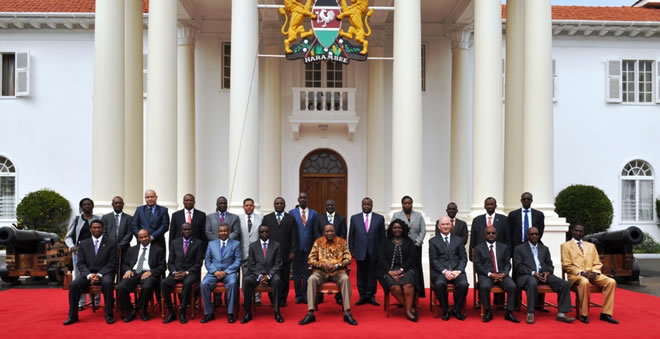
The Ministers and Chiefs of Defence are currently attending the 16th Ordinary Meeting of the Council of Ministers of Defence under the regional umbrella body, the Eastern Africa Standby Force (EASF) in Nairobi, Kenya.

By Christine Lagat and Peter Mutai
Sunday, February 16, 2014
NAIROBI-Countries in the Eastern African region will prioritize investment in modern intelligence gathering to forestall an eruption of conflicts in the region, regional military chiefs said on Saturday.
The regional defense chiefs, who wrapped up a three-day meeting here, agreed that poor early warning systems were to blame for sporadic conflicts and general insecurity.
"Some of the conflicts witnessed in the region lately could have been avoided had we acted on indicators that were above board. We need to invest in early warning to forestall chaos," Chief of Ugandan Defense Forces General Katumba Wamala told journalists here.
Wamala, who spoke on the sidelines of the conference of Eastern African defense chiefs, emphasized that investment in early warning infrastructure will forestall conflicts and balkanization in the region.
Eastern African states have fast-tracked the establishment of a regional standby force with rapid deployment capacity to combat a range of security threats.
Wamala noted that the Eastern Africa Standby Force (EASF) will play a pre-emptive role to avert chaos in the region.
"What happened in Rwanda and South Sudan of late should remind us of the dangers of complacency when signs of looming chaos are visible. The East African Standby Force will help us mitigate against security threats," Wamala told journalists.
The meeting came ten months after East African leaders agreed to set up a 5,500-strong rapid reaction force to help end wars and civil conflicts on the continent.
Leaders and officials from Djibouti, Ethiopia, Somali, Sudan, Comoros, Eritrea, Rwanda, Madagascar, Kenya and the Seychelles signed a deal on April 11 in Ethiopia, outlining the force's legal and policy details together with sources for its 2.5 million U.S. dollar annual budget.
EASF is one of the five regional components of the African Standby Force established by the African Union for the purpose of containing conflicts and enhancing peace and security on the continent.
The EASF was established as a regional mechanism to provide capability for rapid deployment of forces to carry out preventive deployment, rapid intervention, peace support/stability operations and peace enforcement.
Wamala noted that the nature of conflicts has evolved rapidly and there is need for countries to invest in sophisticated intelligence gathering technology to inform security apparatus of the looming danger.
"In the case of South Sudan, indicators were already pointing to a looming war but the response was not prompt. We need to focus on mitigation measures to avert unnecessary loss of lives," Wamala said.
He added that modern early warning systems are crucial to enable eastern African countries tackle emerging security threats like piracy, terrorism and poaching.
The operationalization of a regional standby force with intelligence gathering and combat capabilities will pre-empt the eruption of conflicts.
Kenya's Defense Cabinet Secretary Rachel Omamo said the region was facing insecurity threats, adding that any threat to human peace and security is a major impediment to economic and social development.
"The EASF provides a viable instrument through which crises and threats of this nature can be surmounted collectively not only within our region by anywhere on the continent," Omamo said.
She decried that Sub-Saharan Africa in general and Eastern Africa region in particular have over the year experienced political and social upheavals that come with great loss of human life, destruction of property and disruption of peaceful coexistence.
She said recent challenges to peace in South Sudan and the threat to security posed by terrorist groups such as Al-Shabaab attest to this.
The African Union (AU) Commissioner for Peace and Security, Ambassador Smail Chergui, stressed that early warning infrastructure is an integral component of peace and stability in any country.
"African countries should have the capacity to respond to crises promptly and this calls for early detection on possible threats to peace," Chergui told the military chiefs.
The African Union has supported the establishment of a deployable force to combat new security challenges in the continent.
"To sustain peace and stability in the region, security apparatus should coordinate deterrent measures like early warning. "